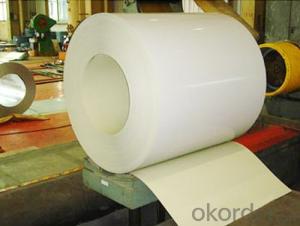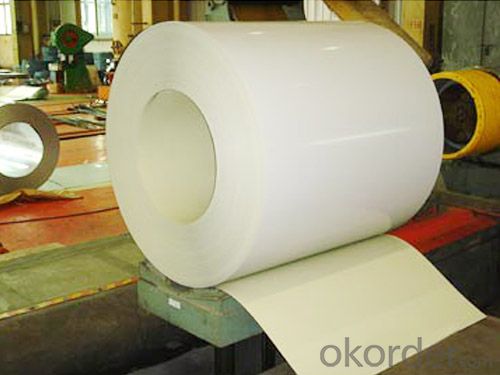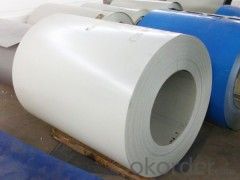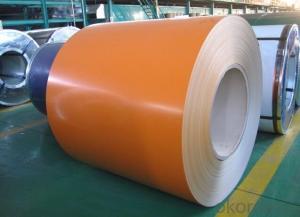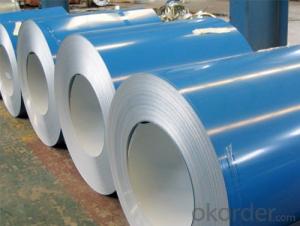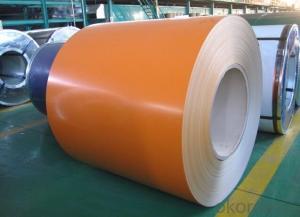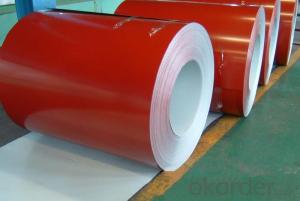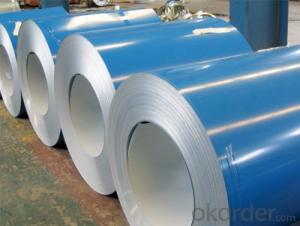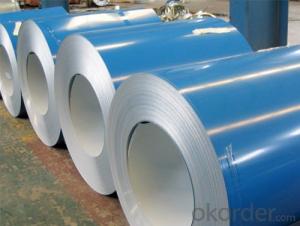Pre-painted Galvanized Sheet Coil with Prime Quality and Lowest Price
- Loading Port:
- Shanghai
- Payment Terms:
- TT OR LC
- Min Order Qty:
- 100 m.t.
- Supply Capability:
- 10000 m.t./month
OKorder Service Pledge
OKorder Financial Service
You Might Also Like
1.Structure of Pre-painted Galvanized/Aluzinc Steel Coil Description
With GI (aluzinc) as base metal, after pretreatment (degrease and chemical treatment) and liquid dope with several layers of color, then after firing and cooling, finally the plate steel is called pre-painted galvanized (aluzinc) steel. Pre-painted galvanized steel is good capable of decoration, molding, corrosion resistance. It generally displays workability, durability and weather resistance.
2.Main Features of the Pre-painted Galvanized/Aluzinc Steel Coil
• Excellent corrosion resistance
• Excellent weather resistance
• Capability of decoration, molding, corrosion resistance
• Workability, durability
• Excellent heat resistance performance
• High strength
• Good formability
• Good visual effect
3.Pre-painted Galvanized/Aluzinc Steel Coil Images
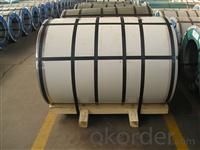
4.Pre-painted Galvanized/Aluzinc Steel Coil Specification
Quality standar: JIS G3312 CGCC & CGLCC
Hardness of P: Both soft and hard quality are available
Surface finish: with or without protect film
Thickness : 0.14-1.20 mm
Width : 914mm, 1000mm, 1220mm and 1250mm, thickness 600-1250mm is available
Finish by coil or sheet: Both sheet and coil are available
8Zinc coating: 60-275G/M2, both sides
Paint thickness for top side : 5 micron primer + (10-20) microns modified polyester, any RAL color code.
Paint thickness for back side: (5-10) microns Epoxy
Weight per coil: 4-6 tons, also can be upon customer's requirements
Max loading weight in one 20ft container : 25 tons generally
5. FAQ of Pre-painted Galvanized/Aluzinc Steel Coil
We have organized several common questions for our clients,may help you sincerely:
1. What is the minimum order quantity ?
Our MOQ is 50mt for each size. And we will consider to give more discount if you make big order like 1000 tons and more. Further more, the more appropriate payment term your offer the better price we can provide.
2. How long can we receive the product after purchase?
Usually within thirty working days after receiving buyer’s advance payment or LC. We will arrange the factory manufacturing as soon as possible. The cargo readiness usually takes 15-25 days, but the shipment will depend on the vessel situation.
3. How to guarantee the quality of the products?
We have established the international advanced quality management system,every link from raw material to final product we have strict quality test;We resolutely put an end to unqualified products flowing into the market. At the same time, we will provide necessary follow-up service assurance.
- Q: How are steel coils used in the manufacturing of metalworking tools?
- Steel coils are used in the manufacturing of metalworking tools by being formed and shaped into various components such as blades, cutting edges, and handles. These coils serve as the primary raw material, which is then processed and treated to create durable and high-quality tools that can withstand the rigors of metalworking processes.
- Q: Can steel coils be coated with anti-microbial materials?
- Yes, steel coils can be coated with anti-microbial materials. These coatings can help inhibit the growth of bacteria, fungi, and other microorganisms, making the steel coils more resistant to contamination and reducing the risk of transmission of harmful pathogens.
- Q: What are the common methods of painting steel coils?
- Painting steel coils can be done using various methods, depending on specific requirements and desired outcomes. Below are some commonly used techniques: 1. The most frequently employed method for painting steel coils is coil coating. It involves applying a layer of paint to the coil's surface before it is formed into its final shape. The coil is initially cleaned and treated with chemicals to ensure proper paint adhesion. Various techniques, such as roll coating, spray coating, or dip coating, are used to apply the paint. Finally, the coil is cured in an oven to ensure the paint dries and adheres correctly. 2. Electrostatic painting is another method where an electrostatic charge is used to apply paint to the steel coil. After cleaning and pre-treatment, an electrostatic charge is applied to the paint particles. These charged particles are attracted to the grounded coil, resulting in an even and efficient paint application. This method is commonly used for high-performance coatings due to its excellent coverage and adhesion. 3. For applications requiring a durable and long-lasting finish, powder coating is a popular method. Dry powder paint is electrostatically applied to the coil's surface. The powder adheres to the coil due to the electrostatic charge, and then the coil is heated in an oven to melt and cure the powder, creating a smooth and protective coating. 4. Spray painting is commonly used for smaller steel coils or touch-up applications. A spray gun is used to apply the paint in a controlled and even manner after the coil is cleaned and pre-treated. This method allows for precise control and customization of the paint application. The choice of painting method depends on factors such as desired finish, durability requirements, cost considerations, and the specific application of the steel coil. Each method has its own advantages and limitations, so it is crucial to select the most suitable one based on the project's specific needs and constraints.
- Q: What are the limitations of using steel coils in certain applications?
- Steel coils have a few limitations that may restrict their use in certain applications. Firstly, steel coils can be heavy and bulky, making them less suitable for applications where weight reduction is crucial. For instance, in industries such as aerospace or automotive, where lightweight materials are preferred to enhance fuel efficiency and improve performance, steel coils may not be the most suitable choice. Secondly, steel coils are vulnerable to corrosion, especially in environments with high moisture or exposure to chemicals. This limitation can restrict their use in applications where resistance to corrosion is crucial, such as marine or coastal structures. Additional protective coatings or regular maintenance may be required to mitigate this limitation, adding to the overall cost and maintenance efforts. Moreover, steel coils may not possess the necessary flexibility or malleability required for certain applications. In industries such as construction or manufacturing, where materials need to be easily shaped or bent into specific forms, steel coils might not offer the desired level of flexibility. This limitation can lead to difficulties in achieving desired designs or may require additional processing steps to mold the steel coils into the desired shape. Lastly, steel coils can have limitations in terms of their temperature resistance. In high-temperature applications, such as in furnaces or power generation, steel coils may experience thermal expansion or deformation, which can compromise their structural integrity. In such cases, alternative materials with higher temperature resistance, such as refractory metals or ceramics, may be more suitable. Overall, while steel coils are widely used and versatile materials, their limitations in terms of weight, corrosion resistance, flexibility, and temperature resistance can restrict their use in certain applications. It is crucial to consider these limitations and assess the specific requirements of the application when selecting materials for optimal performance and durability.
- Q: What are the dimensions of steel coils used in bridge construction?
- The dimensions of steel coils used in bridge construction can vary depending on the specific requirements of the project. However, typical dimensions for steel coils used in bridge construction range from 0.5 to 2 inches in thickness and 24 to 72 inches in width.
- Q: How do steel coils contribute to thermal insulation in buildings?
- Steel coils do not directly contribute to thermal insulation in buildings. Steel coils are typically used in the construction of structures and for various applications, but they do not have inherent thermal insulation properties. Other materials such as insulation boards, panels, or foams are commonly used for thermal insulation in buildings.
- Q: Can steel coils be coated with anti-graffiti materials?
- Yes, steel coils can be coated with anti-graffiti materials.
- Q: Can steel coils be coated with phosphorescent materials?
- Yes, steel coils can be coated with phosphorescent materials. The phosphorescent coating can be applied to the surface of the steel coils, allowing them to emit a glow in the dark or low-light conditions.
- Q: I have to explain some functions of stainless steel but after days of searching I cant find an answer. Thankyou in advance for your help :)
- IT doesn't rust.
- Q: What could the impurities in steel wool be?And why are they there?Thanks for your help :)
- Impurities in steel wool would be of the elemental type. I'm sure steel wool is a mixture of different low grade not good for much of anything else materials. There may be excessive impurities such as lead, cobalt, boron, aluminum etc... in the steel wool. There may also be solvent residue on the wool i.e cleaner, lubricant etc.. I'm sure every batch is different - I know the iron level is high thats what makes them rust quickly.
Send your message to us
Pre-painted Galvanized Sheet Coil with Prime Quality and Lowest Price
- Loading Port:
- Shanghai
- Payment Terms:
- TT OR LC
- Min Order Qty:
- 100 m.t.
- Supply Capability:
- 10000 m.t./month
OKorder Service Pledge
OKorder Financial Service
Similar products
Hot products
Hot Searches
Related keywords
